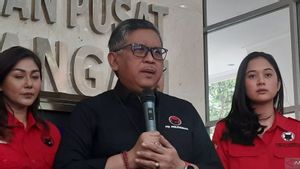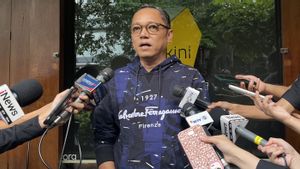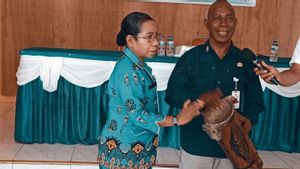JAKARTA The joining of President Joko Widodo's youngest son, Kaesang Pangarep, to the Indonesian Solidarity Party (PSI) has re-emerged rumors that Jokowi is building oligarchy and dynastic politics for the survival of his power.
Before Kaesang was anchored at PSI, Jokowi's eldest son, Gibran Rakabuming Raka and his son-in-law, Bobby Nasution first entered into the political arena in the 2020 Pilkada. Both were then elected as Mayors of Solo and Medan.
The election of Gibran and Bobby can be said to be embryos in the development of the politics of the Jokowi dynasty. Although Gibran and Bobby's candidacy in the elections is guaranteed by the constitution, Jokowi's active position as president raises concerns about conflicts of interest.
In addition, the election of Gibran and Bobby as mayor also raised the potential for domination of Jokowi's family in the national political arena. Moreover, if there are other Jokowi families who decide to enter politics.
A political commotion occurred when Kaesang was 'at that time, PSI was predicted to become a candidate for mayor of Depok by a political party known as jargon 'Jokowism'. Not to mention when several PSI cadres filed for judicial review to change the requirements to become vice presidential candidates from 40 years to 35 years.
This is suspected to smooth Gibran's way to the RI-2 seat in 2024. Moreover, it has become a common secret if Jokowi's eldest son is noticed by presidential candidate Prabowo Subianto or is on the PDI-P radar that carries Ganjar Pranowo.
According to a political observer from UGM, Mada Sukmajati, dynastic politics is an ordinary phenomenon and is not necessarily a successful guarantee for the successor to the dynasty. Because, theoretically dynastic politics is used as a defense strategy after an incumbent is no longer in office and can be a strategy to expand political support.
"This can be in the context of securing relatives who are being incumbent or in a longer-term context, the person concerned himself will fight for positions," he said, Monday, October 3.
If you look back, even if it is true that Jokowi is trying to build his dynastic politics, it is not something strange. In the second term of his presidency, Jokowi switched from a sleek cabinet to a fat cabinet. He reasoned that he intends to accommodate all interests in the name of the people's interests. Not enough with six supporting parties in parliament, Jokowi added the Gerindra Party as part of the Advanced Indonesia Cabinet.
In an article published in South East Asia Research entitled 'Revising the Rise of Jokowi: The Triumph of Reform or An Oligarchic Adaptation of Post-clientelist Initiatives?' 2016, Yuki Fukuoka and Luky Djani considered that from the start Jokowi was no longer a figure who was imaged to the public during the campaign, namely prioritizing the interests of the people above the party.
Only a few months running the government, the new president of Indonesia, Jokowi, began to disappoint his supporters who hoped he could improve the quality of democracy. Contrary to the campaign promises about a 'clean' and 'professional' government without overthrowing, Jokowi gave a strategic position to the interests of the oligarchy and indicated that his decision was actually based on his supporting parties," they wrote.
Lowy Institute researcher Ben Bland in his article entitled Man of Contradictions: Joko Widodo and the Struggle to Remake Indonesia in 2020 considers that reciprocal politics may be one of Jokowi's powerful ways to smooth his power. He gave an example of Jokowi's move to embrace Prabowo could be considered an attempt to betrayal democracy.
With Prabowo's embrace, the Gerindra Party will automatically support Jokowi's government. "Then who can be the opposition that should be in a democratic system? He did that to paralyze the opposition," wrote Bland.
Director of the Buffet Institute of Global Affairs, Jeffrey A. Rach in his 2013 research entitled 'Oligarchy and Democracy in Indonesia' considers that Jokowi is a product of political oligarchy itself. According to him, Jokowi's popularity and victory in the 2012 DKI Jakarta Pilkada occurred due to support from students to the housewives' association.
However, he said, this important part of this democratic story was made possible by the oligarchic movement where the power of the duit people placed Jokowi in front of voters. Despite receiving grassroots support, Jokowi fought in the gubernatorial election not because of grassroots initiatives or political movements.
Jokowi's oligarchy of power can be seen from one name, Luhut Binsar Panjaitan. Luhut is one of the ministers who knows Jokowi the longest. Their relationship is not only a government but also a business. Luhut was never absent in two periods of Jokowi's government even though his position continued to change.
He served as Minister of Industry and Trade, Chief of Presidential Staff, Coordinating Minister for Political, Legal and Security Affairs, Coordinating Minister for Maritime Affairs and Investment, to other positions such as Deputy Chair of the COVID-19 Control Policy Committee and National Economic Recovery.
Jokowi's dynastic and oligarchy politics can also be reflected when the former mayor of Solo stated that he would be fussy in the 2024 presidential election. Of the three axes that currently exist, there are two presidential readings that are close to Jokowi, namely Prabowo Subianto and Ganjar Pranowo. Don't forget too, even though Anies Baswedan carries the theme of change, his companion Muhaimin Iskandar is the General Chairperson of the PKB who in fact is still a party supporting Jokowi's government.
Executive Director of the Voxpol Center Research and Consulting, Pangi Syarwi Chaniago assessed Jokowi's reckless steps because he wanted shares from the presidential candidate's victory. In fact, he doesn't seem to care if he has to stand between two legs so that he can still be involved in strategic decisions after the end of his leadership term in the future.
Gibran is referred to as Prabowo's vice presidential candidate. That's what makes their interests even stronger, indicating that Prabowo, Erick, and Ganjar will still follow Jokowi's political direction line," he said.
According to him, Jokowi's move is not a disgrace, because it is important for those who will end their positions to own stocks that can be maintained considering that many politicians are not ready if after having no legitimacy, they will lose their cold hands.
In addition, in his analysis, if he reads the political gesture, even though Prabowo is the party chairman, Jokowi is considered to still have a big role to play in managing the tempo of the game in welcoming the presidential election. Regarding support for presidential reading, Pangi believes that Jokowi does not want to put eggs in the same basket.
"It could be 50 percent to Prabowo and Ganjar 50 percent, later at the new end all out will support one of them. The point is that Jokowi wants to keep Ganjar and Prabowo's electability safe under control," he said.
VOIR éGALEMENT:
Pangi saw that Jokowi was carrying out political maneuvers to show that full political control was in his hands, and seemed to really enjoy the political game he was drafting. "So, Ganjar and Prabowo remain under his full control, because on February 14 after the 2024 election Jokowi is still president, his political operators are still Prabowo and Ganjar, but Jokowi still controls everything, even though power begins to decline because he is no longer president," he added.
In 2020, Jokowi dismissed accusations of building dynastic politics when Gibran and Bobby contested the elections. The seventh President of the Republic of Indonesia argued that dynastic politics had appointed his family members to occupy political positions. For example, I appointed my son to be minister. But if a family, children, for example, register themselves, participate in the elections, which determines the people, not Jokowi," he kilah.
Likewise, when Kaesang joined and was appointed as PSI General Chair. Jokowi emphasized that his youngest son was an adult and was able to make his own decisions. Nevertheless, he admitted that he had approved Kaesang's decision to enter politics.
"About Kaesang being a ketum, ask PSI and Kaesang. Kaesang asks for the blessing of his parents, I give his blessing. In the family, I am used to getting used to it when I have a family, let alone my wife, must be independent and responsible. What is decided is to calculate the risks, both and bad," said Jokowi.
The Board of Trustees of the Association for Elections and Democracy (Perludem), Titi Anggraini stated, basically everyone has the right to enter politics. However, under certain conditions, dynastic politics will be a bad example for political culture and ecosystems.
Apart from Jokowi's edge, Titi considered that when Gibran and Bobby ran for regional head, this phenomenon could be said to be the beginning of the birth of a new political dynasty from the Jokowi clan.
"It is morally unfortunate by many groups. Because it turns out that power is tempting, and the temptation is difficult to be dismissed by the environment around Jokowi," said Titi
The English, Chinese, Japanese, Arabic, and French versions are automatically generated by the AI. So there may still be inaccuracies in translating, please always see Indonesian as our main language. (system supported by DigitalSiber.id)











